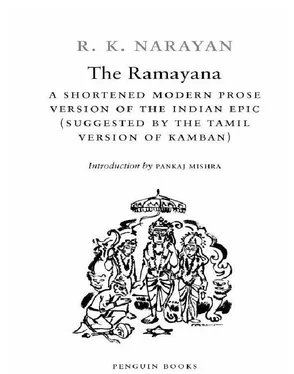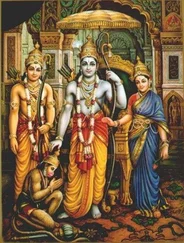Махариши Вальмики - The Ramayana
Здесь есть возможность читать онлайн «Махариши Вальмики - The Ramayana» весь текст электронной книги совершенно бесплатно (целиком полную версию без сокращений). В некоторых случаях можно слушать аудио, скачать через торрент в формате fb2 и присутствует краткое содержание. Жанр: Старинная литература, на английском языке. Описание произведения, (предисловие) а так же отзывы посетителей доступны на портале библиотеки ЛибКат.
- Название:The Ramayana
- Автор:
- Жанр:
- Год:неизвестен
- ISBN:нет данных
- Рейтинг книги:3 / 5. Голосов: 1
-
Избранное:Добавить в избранное
- Отзывы:
-
Ваша оценка:
- 60
- 1
- 2
- 3
- 4
- 5
The Ramayana: краткое содержание, описание и аннотация
Предлагаем к чтению аннотацию, описание, краткое содержание или предисловие (зависит от того, что написал сам автор книги «The Ramayana»). Если вы не нашли необходимую информацию о книге — напишите в комментариях, мы постараемся отыскать её.
The Ramayana — читать онлайн бесплатно полную книгу (весь текст) целиком
Ниже представлен текст книги, разбитый по страницам. Система сохранения места последней прочитанной страницы, позволяет с удобством читать онлайн бесплатно книгу «The Ramayana», без необходимости каждый раз заново искать на чём Вы остановились. Поставьте закладку, и сможете в любой момент перейти на страницу, на которой закончили чтение.
Интервал:
Закладка:
“Which battle?” he asked, not yet fully awake.
And they had to refresh his memory. “Your brother has fought and has been worsted; our enemies are breaking in, our fort walls are crumbling. . . .”
Kumbakarna was roused. “Why did not anyone tell me all this before? Well, it is not too late; I will deal with that Rama. His end is come.” Thus saying, he strode into Ravana’s chamber and said, “Don’t worry about anything any more. I will take care of everything.”
Ravana spoke with anxiety and defeat in his voice. Kumbakarna, who had never seen him in this state, said, “You have gone on without heeding anyone’s words and brought yourself to this pass. You should have fought Rama and acquired Sita. You were led away by mere lust and never cared for anyone’s words. . . . Hm . . . This is no time to speak of dead events. I will not forsake you as others have done. I’ll bring Rama’s head on a platter.”
Kumbakarna’s entry into the battle created havoc. He destroyed and swallowed hundreds and thousands of the monkey warriors and came very near finishing off the great Sugreeva himself. Rama himself had to take a hand at destroying this demon; he sent the sharpest of his arrows, which cut Kumbakarna limb from limb; but he fought fiercely with only inches of his body remaining intact. Finally Rama severed his head with an arrow. That was the end of Kumbakarna.
When he heard of it, Ravana lamented, “My right hand is cut off.”
One of his sons reminded him, “Why should you despair? You have Brahma’s gift of invincibility. You should not grieve.” Indrajit told him, “What have you to fear when I am alive?”
Indrajit had the power to remain invisible and fight, and accounted for much destruction in the invader’s camp. He also created a figure resembling Sita, carried her in his chariot, took her before Rama’s army and killed her within their sight.
This completely demoralized the monkeys, who suspended their fight, crying, “Why should we fight when our goddess Sita is thus gone?” They were in a rout until Vibishana came to their rescue and rallied them again.
Indrajit fell by Lakshmana’s hand in the end. When he heard of his son’s death, Ravana shed bitter tears and swore, “This is the time to kill that woman Sita, the cause of all this misery.”
A few encouraged this idea, but one of his councillors advised, “Don’t defeat your own purpose and integrity by killing a woman. Let your anger scorch Rama and his brother. Gather all your armies and go and vanquish Rama and Lakshmana, you know you can, and then take Sita. Put on your blessed armour and go forth.”
12
RAMA AND RAVANA IN BATTLE
Every moment, news came to Ravana of fresh disasters in his camp. One by one, most of his commanders were lost. No one who went forth with battle cries was heard of again. Cries and shouts and the wailings of the widows of warriors came over the chants and songs of triumph that his courtiers arranged to keep up at a loud pitch in his assembly hall. Ravana became restless and abruptly left the hall and went up on a tower, from which he could obtain a full view of the city. He surveyed the scene below but could not stand it. One who had spent a lifetime in destruction, now found the gory spectacle intolerable. Groans and wailings reached his ears with deadly clarity; and he noticed how the monkey hordes revelled in their bloody handiwork. This was too much for him. He felt a terrific rage rising within him, mixed with some admiration for Rama’s valour. He told himself, “The time has come for me to act by myself again.”
He hurried down the steps of the tower, returned to his chamber, and prepared himself for the battle. He had a ritual bath and performed special prayers to gain the benediction of Shiva; donned his battle dress, matchless armour, armlets, and crowns. He had on a protective armour for every inch of his body. He girt his sword-belt and attached to his body his accoutrements for protection and decoration.
When he emerged from his chamber, his heroic appearance was breathtaking. He summoned his chariot, which could be drawn by horses or move on its own if the horses were hurt or killed. People stood aside when he came out of the palace and entered his chariot. “This is my resolve,” he said to himself: “Either that woman Sita, or my wife Mandodari, will soon have cause to cry and roll in the dust in grief. Surely, before this day is done, one of them will be a widow.”
The gods in heaven noticed Ravana’s determined move and felt that Rama would need all the support they could muster. They requested Indra to send down his special chariot for Rama’s use. When the chariot appeared at his camp, Rama was deeply impressed with the magnitude and brilliance of the vehicle. “How has this come to be here?” he asked.
“Sir,” the charioteer answered, “my name is Matali. I have the honour of being the charioteer of Indra. Brahma, the four-faced god and the creator of the Universe, and Shiva, whose power has emboldened Ravana now to challenge you, have commanded me to bring it here for your use. It can fly swifter than air over all obstacles, over any mountain, sea, or sky, and will help you to emerge victorious in this battle.”
Rama reflected aloud, “It may be that the rakshasas have created this illusion for me. It may be a trap. I don’t know how to view it.” Whereupon Matali spoke convincingly to dispel the doubt in Rama’s mind. Rama, still hesitant, though partially convinced, looked at Hanuman and Lakshmana and asked, “What do you think of it?” Both answered, “We feel no doubt that this chariot is Indra’s; it is not an illusory creation.”
Rama fastened his sword, slung two quivers full of rare arrows over his shoulders, and climbed into the chariot.
The beat of war drums, the challenging cries of soldiers, the trumpets, and the rolling chariots speeding along to confront each other, created a deafening mixture of noise. While Ravana had instructed his charioteer to speed ahead, Rama very gently ordered his chariot-driver, “Ravana is in a rage; let him perform all the antics he desires and exhaust himself. Until then be calm; we don’t have to hurry forward. Move slowly and calmly, and you must strictly follow my instructions; I will tell you when to drive faster.”
Ravana’s assistant and one of his staunchest supporters, Mahodara—the giant among giants in his physical appearance—begged Ravana, “Let me not be a mere spectator when you confront Rama. Let me have the honour of grappling with him. Permit me to attack Rama.”
“Rama is my sole concern,” Ravana replied. “If you wish to engage yourself in a fight, you may fight his brother Lakshmana.”
Noticing Mahodara’s purpose, Rama steered his chariot across his path in order to prevent Mahodara from reaching Lakshmana. Whereupon Mahodara ordered his chariot-driver, “Now dash straight ahead, directly into Rama’s chariot.”
The charioteer, more practical-minded, advised him, “I would not go near Rama. Let us keep away.” But Mahodara, obstinate and intoxicated with war fever, made straight for Rama. He wanted to have the honour of a direct encounter with Rama himself in spite of Ravana’s advice; and for this honour he paid a heavy price, as it was a moment’s work for Rama to destroy him, and leave him lifeless and shapeless on the field. Noticing this, Ravana’s anger mounted further. He commanded his driver, “You will not slacken now. Go.” Many ominous signs were seen now—his bow-strings suddenly snapped; the mountains shook; thunders rumbled in the skies; tears flowed from the horses’ eyes; elephants with decorated foreheads moved along dejectedly. Ravana, noticing them, hesitated only for a second, saying, “I don’t care. This mere mortal Rama is of no account, and these omens do not concern me at all.” Meanwhile, Rama paused for a moment to consider his next step; and suddenly turned towards the armies supporting Ravana, which stretched away to the horizon, and destroyed them. He felt that this might be one way of saving Ravana. With his armies gone, it was possible that Ravana might have a change of heart. But it had only the effect of spurring Ravana on; he plunged forward and kept coming nearer Rama and his own doom.
Читать дальшеИнтервал:
Закладка:
Похожие книги на «The Ramayana»
Представляем Вашему вниманию похожие книги на «The Ramayana» списком для выбора. Мы отобрали схожую по названию и смыслу литературу в надежде предоставить читателям больше вариантов отыскать новые, интересные, ещё непрочитанные произведения.
Обсуждение, отзывы о книге «The Ramayana» и просто собственные мнения читателей. Оставьте ваши комментарии, напишите, что Вы думаете о произведении, его смысле или главных героях. Укажите что конкретно понравилось, а что нет, и почему Вы так считаете.












